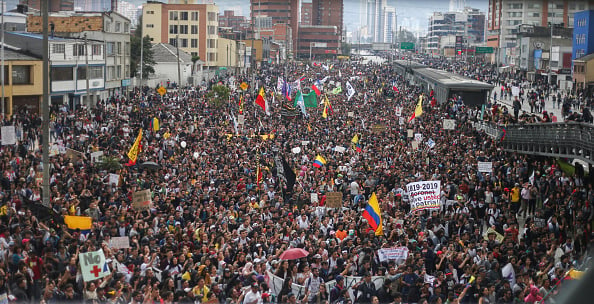SITUATION REPORT
- What began as anti-tax reform protests on 28 April have morphed and spread to nationwide anti-government unrest in the ensuing days. Protests quickly turned violent as security forces cracked down and clashed with demonstrators across the country. Cali, Bogotá, Medellín, and Barranquilla have been epicenters for violent unrest.
-
Despite President Ivan Duque withdrawing his proposal on 2 May, protests have continued for the last week. At least 40 people have been killed and hundreds more have been detained amid clashes between the demonstrators and police, who have been accused of being heavy-handed in their response.
- Tens of thousands of people have taken to the streets across the country in the last week. In Cali, the protests-turned-riots have lead to roadblocks, triggering disruptions at a regional airport and shortages of fuel and food. During the unrest, rioters vandalized police stations, public transportation hubs, and looted grocery stores.

Citizens of Colombia storm the streets to protest against the government - Source Getty Images.
ASSESSMENT
-
Amid COVID-19, Colombia's GDP fell nearly 7% in 20
-
20 and unemployment climbed to nearly 17%. Nearly half of the population is now living in poverty. These poor economic conditions are fueling the unrest.
-
Demonstrations are likely to continue, especially in the capital Bogota. Additional targets for unrest include public and private infrastructure, transportation hubs, police stations, and government buildings. Clients should avoid these sites as possible.
- Clients should anticipate utilities and travel disruptions, to include electricity, water, fuel, and public transportation. Maintain food, fuel, and water supplies in anticipation of possible shortages.
Standing by to Support
- Global Guardian is standing by to support across Colombia, from executive protection, to custom intelligence threat assessments, to medical evacuation and support. Click below to request security assistance.




